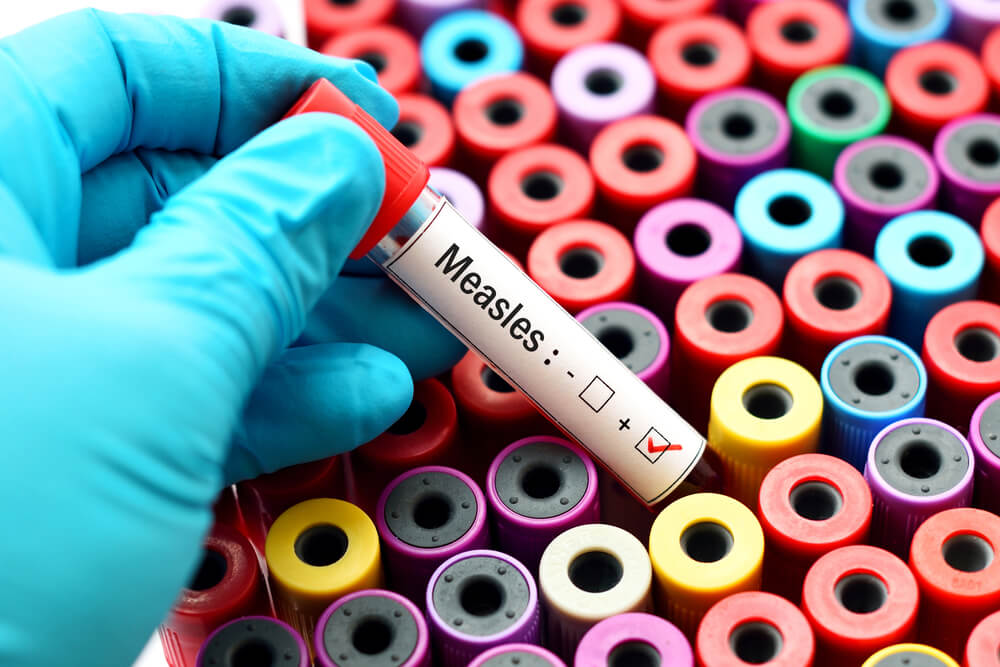Measles represent one of the most contagious viruses on the planet. Although a measles outbreak has been under control in the previous years, with the decreased number of vaccinations, many people and children have had them.
It’s important that all people are vaccinated against measles, especially pregnant women since having measles during pregnancy can cause serious medical complications for both the mother and the baby. To make sure you and your baby are safe at all times, it’s paramount to protect yourself from measles.
Measles and Pregnancy
To be able to recognize measles and protect yourself from infection, you should be familiar with: what the infection feels like, the most common symptoms, how they are transmitted, and how to behave if you suspect you have them.
1. How are measles transmitted?
The measles virus is extremely contagious and usually lives in the mouth and nose mucus of the infected person. A person can transmit the virus to others by sneezing and coughing, and the virus can survive up to two hours in the air. If you are in a room where someone with measles sneezed or coughed in the previous two hours, the chances are that you will catch measles as well.
People who have measles are contagious even four days after the appearance of the rash, so it’s important to avoid contact with the infected in the first days of their infection.
2. What are the most common symptoms of measles?
Just like with other viruses of this kind, the most common symptoms include fever, exhaustion, cough, a runny nose, as well as red and itchy eyes. Koplik spots (white lesions that appear on your inner cheeks) and body rash are the most certain signs of measles. However, exposure to measles while pregnant can be completely different and very hard to diagnose because the woman’s body is in a naturally-changed state.
Once you’re exposed to the virus, it can take as much as 21 days before you develop any symptoms and the illness actually appears.
3. How to know if you’re immune to measles?

People and children who have received at least one dose of the MMR (Measles-Mumps-Rubella) vaccine are probably immune to measles and shouldn’t worry too much. However, you can always ask your doctor to check if you’re immune to the illness by doing a blood test.
Pregnant women who do a routine rubella test during pregnancy and it comes back positive are most likely immune to measles. Those who are not sure about their vaccinations should consult their OB/GYN and ensure they have been vaccinated before pregnancy.
If you’re planning a pregnancy and don’t know if you’ve had the shot, talk to your health care provider about getting an MMR vaccine. Once you are vaccinated against measles, you should wait at least 4 weeks to become pregnant.
4. What to do if you’re exposed to measles during pregnancy?
If you suspect you have been exposed to measles while pregnant, you should contact your health care provider immediately. Even though you might not have any of the common symptoms, you should get tested for measles to make sure you don’t have them.
Depending on your measles immunity, your health care provider will determine the most appropriate and the safest course of action for you and the baby.
5. How are measles treated in pregnant women?
If you think you might have measles, your doctor should be able to run some blood tests and perform a swab test by taking a sample from your nose to determine the presence of the illness. If the tests show that you have measles, you should talk to your doctor about the best treatment options.
Your health care provider might advise you to stay at home and avoid contact with other people at least four days after you’ve developed a rash. There is no known antiviral therapy for pregnant women, but the illness can rapidly become serious, so close monitoring and making sure their lung function is okay is the best way to help pregnant women suffering from measles.
Being exposed to measles during pregnancy doesn’t have to be a major issue if you have been vaccinated accordingly. However, if you don’t know or aren’t sure about your vaccination status, you should contact your doctor and take the necessary steps to avoid serious health complications for you and the baby.
At Trogolo Obstetrics and Gynecology, we devote ourselves to making sure your pregnancy goes without any serious complications. If you suspect you might have measles, you can contact us and let us do all the necessary tests and screenings.





